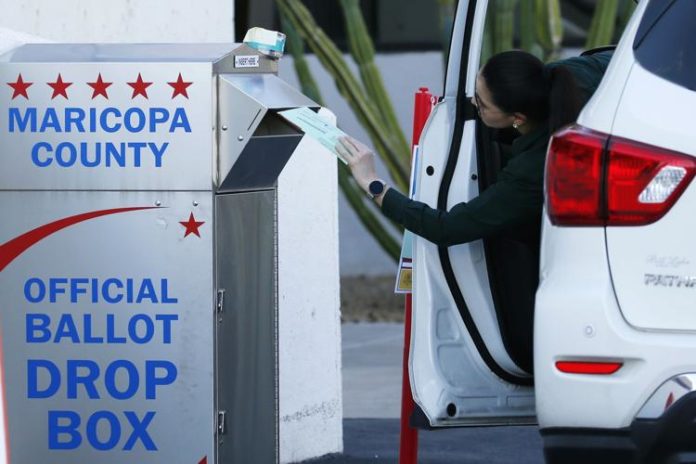
A coalition of groups filed a lawsuit against two voting laws passed in the last session, arguing that the statutes could disenfranchise thousands of voters.
Mi Familia Vota, Arizona Coalition for Change, Living United for Change in Arizona (LUCHA), and Chispa Arizona alleged in the lawsuit filed on Aug. 17 that the bills “violate the right of all Arizonans to vote.”
“The laws will have a severe and disproportionate impact on voters of color in Arizona, especially Native American, Latino, and Black voters,” they said.
Rodney Ott, attorney for the coalition, said the bills were “designed to make it harder for Arizonans – especially Arizonans of color – to vote.”
Senate Bill 1485 changes the name of Arizona’s Permanent Early Voting List (PEVL) to Active Early Voting List (AEVL) and sends a postcard to those on the early voting list who do not return at least one early ballot over the course of four years. The card asks if they would like to continue receiving ballots. Only after the card is returned as undeliverable, unreturned or requesting to be pulled from the rolls, would a voter be removed.
The Arizona Coalition for Change argued that the legislation would remove nearly 150,000 from the list. The majority of Arizona voters did so by mail in 2020.
After signing the bill, Gov. Doug Ducey wrote a letter explaining his support.
“Arizona is a national leader when it comes to election integrity and access to the ballot box, and Senate Bill 1485 continues that legacy. In 1992, our state began offering the ability for Arizonans to vote an absentee ballot,” the governor said. “Since then, Arizona has continuously improved and refined our election laws – including intuitively renaming ‘absentee’ voting to ‘early’ voting – and constantly seeking to strengthen the security and integrity of our elections.”
Senate Bill 1003 keeps county election officials from reconciling an unsigned ballot once polls close on Election Day, a process known as curing a ballot. Inconsistent signatures still could be cured after the election.
“The status quo is that if you have an unsigned ballot, it’s not counted or cured after polls close,” bill sponsor Sen. Michelle Ugenti-Rita, R-Scottsdale, said. “Prior to polls closing, they’ll reach out. A missing signature is not a properly executed ballot. It could have been taken from someone’s mailbox.”
House Minority Leader and founder of Arizona Coalition for Change Reginald Bolding, D-Laveen, referred to the legislation as a voter suppression effort.
“As leaders of several of the state’s largest civic engagement organizations, we understand that the freedom to vote is the backbone of our democracy,” he said. “We must do everything we can to defend this sacred right.”
Elizabeth Troutman | The Center Square contributor













